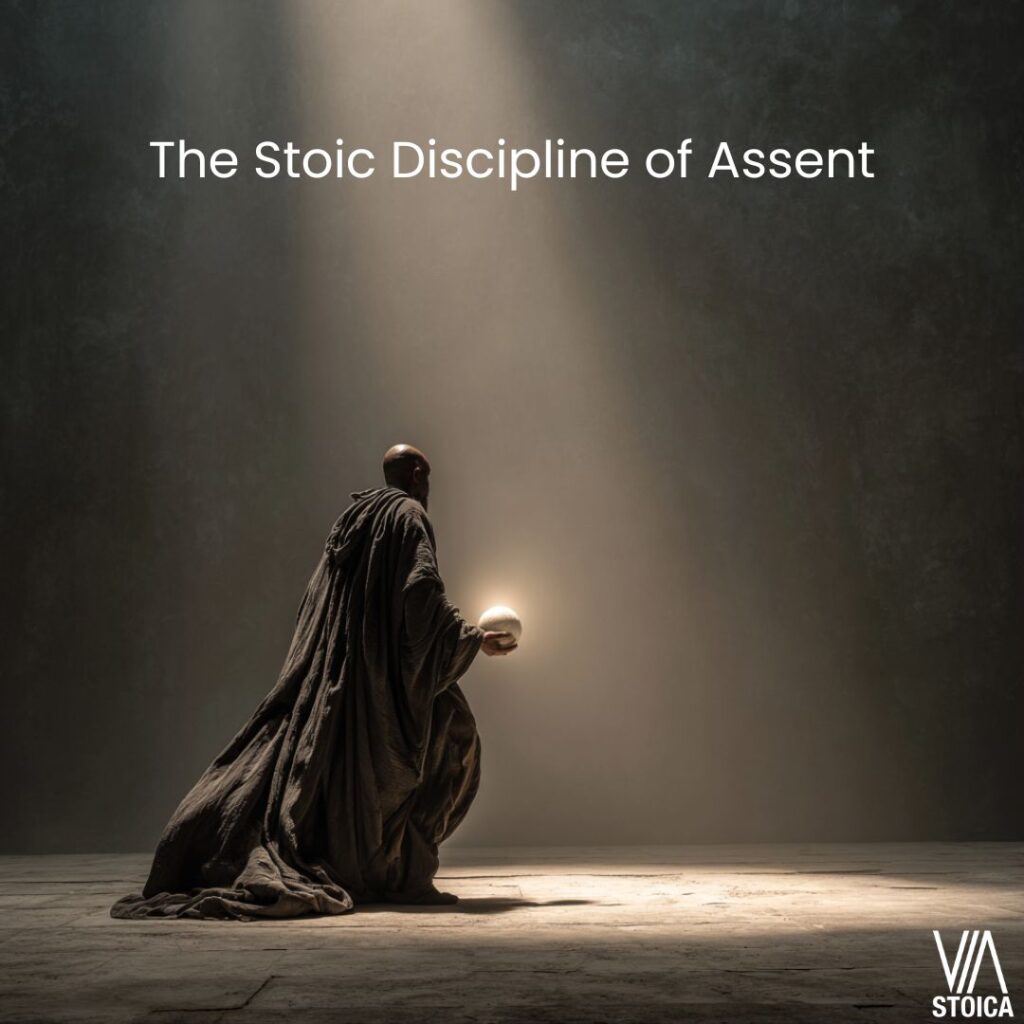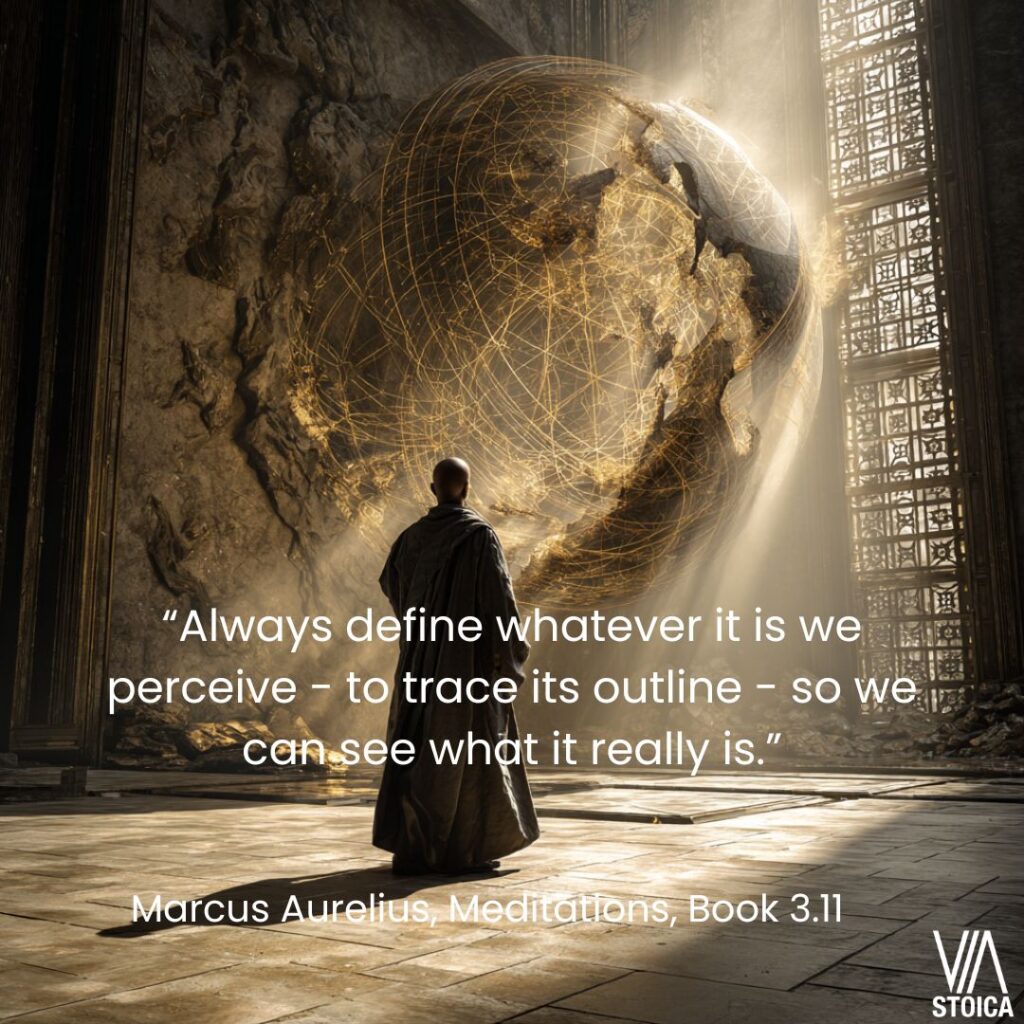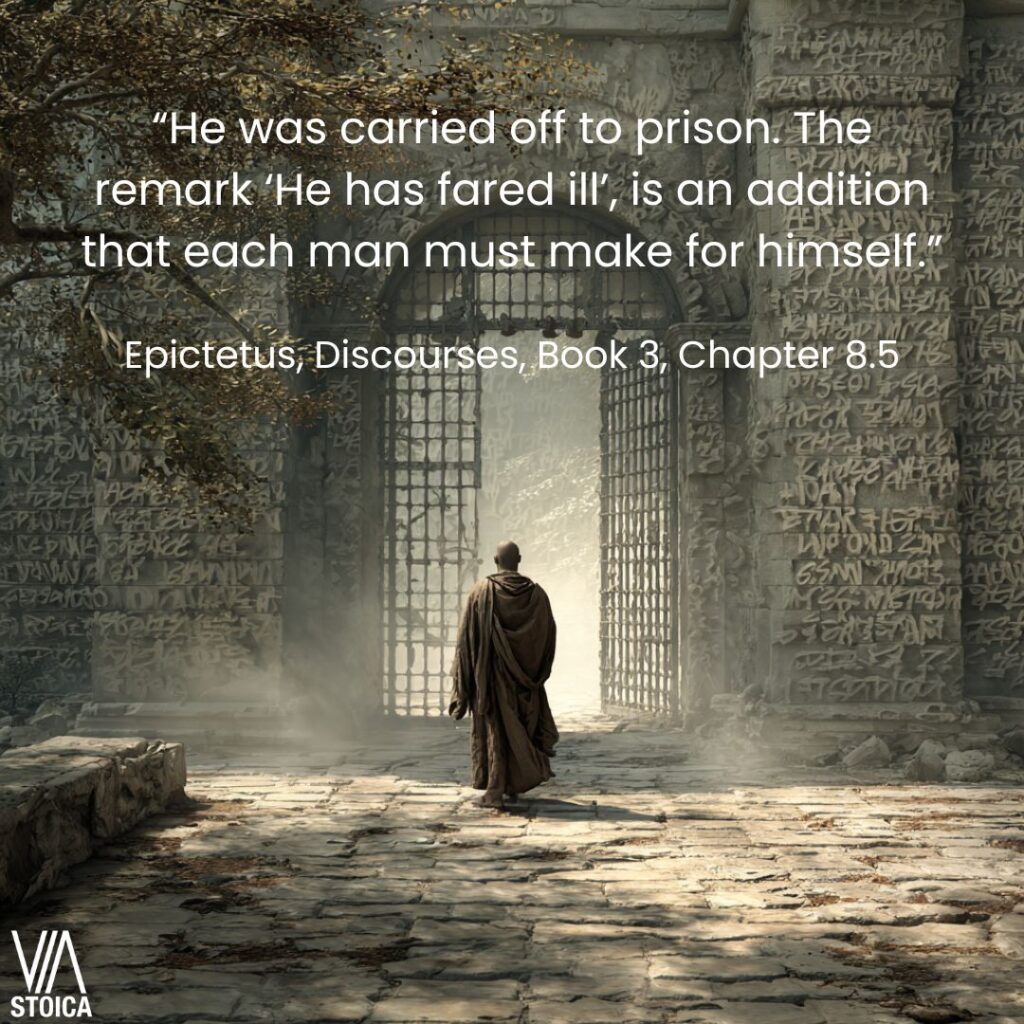How to Practice the Stoic Discipline of Assent
Assent – The Gateway to Freedom
In Stoic philosophy, your freedom begins in a single moment, the instant you decide whether to agree with what appears before your mind. This moment is called assent (synkatathesis, συγκατάθεσις), the voluntary act of the mind in accepting, rejecting, or suspending judgment about an impression (phantasia).

We do not always control what happens to us, or even what thoughts first appear in our minds. But according to the Stoics, we always control what happens next: whether we take that thought as true, false, or undetermined. This power to grant or withhold agreement is what guards the hegemonikon, the “ruling faculty” of the soul, from corruption.
Epictetus captures the practice in a few simple words:
“But, in the first place, do not allow yourself to be carried away by its intensity: but say, ‘impression, wait for me a little. Let me see what you are, and what you represent. Let me test you.”
Epictetus, Discourses, Book 2, Chapter 18.24
By mastering the discipline of assent, we learn to see events as they are, stripped of our automatic value judgments, and to act only from what is true and aligned with virtue.
In Stoicism and Emotion, Margaret Graver states it as follows:
“Assent is defined in intentional terms: it is that event in which one either accepts an impression as true or rejects it as false.”
Margaret Graver, Stoicism and Emotion, Chapter 1
Philosophical Grounding
The discipline of assent sits at the heart of Stoic psychology. The Stoics described the human cognitive process as a sequence:
- Impression (phantasia) — An appearance or mental image caused by something external or internal.
- Proposition — The impression is translated into a thought that can be stated as true or false (“This is bad,” “That is good”).
- Assent (synkatathesis) — The ruling faculty either agrees, disagrees, or suspends judgment.
- Impulse (hormē) — Assent to a proposition about what is good or bad triggers an impulse toward action.
- Action — The external behavior that follows.
In the Stoic system, the discipline of assent belongs to the branch of philosophy called logic (logikē). For the Stoics, logic was not limited to formal argument; it included the study of how we form judgments, how impressions are tested for truth, and how to avoid being deceived. Assent is the practical application of Stoic logic: it is where our reasoning faculty actively decides what to admit as true. By practicing assent, we ensure that our ethical decisions rest on a sound logical foundation.
The Stoics insisted that assent is voluntary. Margaret Graver writes:
“An impression is what one might call a mere thought… What converts thought into belief is a further mental event which is termed variously ‘assent’ (synkatathesis), judgment (krisis), or ‘forming an opinion’ (doxazein).”
Margaret Graver, Stoicism and Emotion, Chapter 1
The Power of Epoché

Alongside acceptance and rejection, the Stoics practiced epoché (ἐποχή), the deliberate suspension of judgment. This is not hesitation born of fear, but a conscious choice to withhold assent when an impression is unclear or incomplete. Epictetus urged his students to “wait for me a little” when confronted with strong appearances, allowing reason to examine them before agreement. For the Stoics, epoché was an act of strength: by refusing to be rushed into belief, the mind remains free, unbound by hasty or false judgments.
This is why Epictetus taught that no one can truly harm you unless you agree to the belief that harm has occurred. It is also why Marcus Aurelius constantly reminded himself to strip events down to their objective core, without the extra layers of subjective interpretation:
“Always define whatever it is we perceive – to trace its outline – so we can see what it really is: its substance. Stripped bare. As a whole. Unmodified. And to call it by its name – the thing itself and its components, to which it will eventually return.”
Marcus Aurelius, Meditations, Book 3.11
Philosophically, the discipline of assent connects to Stoic epistemology. The wise person assents only to kataleptic impressions (φαντασίαι καταληπτικαί), those that are so clear and true they could not be false. All other impressions require careful examination or suspension of judgment (epoché).
In ethical terms, assent is the moral gatekeeper. Every wrong action starts with a wrong assent; every virtuous action starts with a correct one. As Hadot puts it:
“The discipline of assent appears as a constant effort to eliminate all the value-judgments which we bring to bear upon those things which do not depend upon us, and which therefore have no moral value.”
Pierre Hadot, The Inner Citadel, Chapter 6, p. 169
Application and Relevance Today
Although ancient Stoics walked the streets of Athens and Rome, the discipline of assent may be even more critical in the 21st century. We live in an environment overloaded with impressions, news headlines, social media notifications, advertising, instant messages, each demanding instant reaction.
Without the discipline of assent:
- A critical email becomes “They disrespected me.”
- A drop in the stock market becomes “I’m ruined.”
- A friend’s silence becomes “They don’t care about me.”
In each case, the raw fact is neutral. It is the assent to a certain interpretation that produces distress.
This is closely related to modern cognitive psychology’s idea of cognitive distortions, such as jumping to conclusions or emotional reasoning. The Stoic method offers a philosophical, virtue-based way to interrupt those distortions.
Epictetus gives a clear example:

“He was carried off to prison. The remark ‘He has fared ill’, is an addition that each man must make for himself.”
Epictetus, Discourses, Book 3, Chapter 8.5
Practiced daily, assent becomes a kind of mental firewall. Instead of being swept away by outrage on social media, anxiety about uncertain outcomes, or fear triggered by news, you pause and test each impression. You ask: Is this true? Is it within my control? Does it concern virtue? If the answer is no, you let it pass.
Practical Exercises
1. Pause Before You Judge
When an impression strikes, whether it’s a comment, a look, or a news alert, avoid reacting instantly.
- Step 1: Name the impression in neutral terms (“I received a message”; “The price went down”).
- Step 2: Ask, “What do I know for certain right now?”
- Step 3: Decide whether to assent, reject, or suspend judgment.
This is Epictetus’ “Wait for me a little” in action (Discourses, 2.18.24).
2. Describe in Essence
Practice Marcus Aurelius’ stripping technique:
- Take an event or object and break it down into its basic facts.
- Remove adjectives and emotional coloring (“He insulted me” → “He said certain words with a loud voice”).
- Identify its parts and its impermanence.
This reduces emotional overreaction by revealing the thing’s true nature (Meditations, 3.11).
3. Train the Power of Epoché
Make epoché, suspension of judgment, a deliberate skill.
- Step 1: When faced with a strong impression, ask, “Is this a kataleptic impression, one that cannot be false?”
- Step 2: If the answer is no, consciously withhold assent and mark the impression as “unverified.”
- Step 3: Return to it only after gathering more clarity or evidence.
Practiced regularly, epoché strengthens your ability to resist emotional hijacking and keeps the ruling faculty free from hasty beliefs.
Final Reflection
The discipline of assent is the Stoics’ first line of defense and offense in living a rational and virtuous life. By controlling what enters the ruling faculty as belief, you shape your entire moral character. Impressions are inevitable; assent is always up to you.
As Marcus Aurelius reminds himself:
“External things are not the problem. It’s your assessment of them. Which you can erase right now.”
Marcus Aurelius, Meditations, Book 8, 47
Freedom, for the Stoics, is not the ability to get whatever you want. It is the power to never be carried away by what is false, and to act always in harmony with reason.
FAQ
1. Is withholding assent the same as indecision?
No. Withholding assent (epoché) is an active choice to wait for clarity, not avoidance of responsibility.
2. Can we ever give instant assent?
Yes, but only to kataleptic impressions, those that are undeniably true and correspond directly to reality.
3. What’s the difference between impression and belief?
An impression is an appearance; belief requires assent to that appearance as true.
4. Is Stoic assent the same as mindfulness?
It overlaps in awareness, but Stoic assent adds a critical evaluation step grounded in philosophy.
5. What is the Stoic Discipline of Assent?
The Stoic discipline of assent is the practice of evaluating impressions, appearances, or thoughts that come to mind, and deciding whether to accept them as true, reject them as false, or withhold judgment until more is known. It is part of Stoic logic and serves as the mind’s gatekeeper, ensuring that only accurate, rational beliefs enter the ruling faculty (hegemonikon). This protects us from false value judgments and keeps our actions aligned with virtue.
Want to explore more Stoic Practice?
Book a free consultation with one of our Stoic Coaches to get support. Or read more about How to Practice Stoicism here. Listen to the Via Stoica Podcast on Spotify, Apple Podcasts, or YouTube.
Author Bio
Benny Voncken is the co-founder of Via Stoica, where he helps people apply Stoic philosophy to modern life. He is a Stoic coach, writer, and podcast host of The Via Stoica Podcast. With almost a decade of teaching experience and daily Stoic practice, Benny creates resources, workshops, and reflections that make ancient wisdom practical today.
Related Posts
-
 Inner Life Terms
Inner Life TermsWhat Are Values? Principles That Guide Action and Display Nature
What are Values? Most people don’t wake up thinking about their values. They notice them indirectly, when something feels slightly misaligned. When a choice looks right on paper but leaves a faint sense of resistance. When success arrives, yet doesn’t land the way it was expected to. Values are often mistaken for opinions, preferences, or […]
Read more -
 Via Stoica Podcast
Via Stoica PodcastA Stoic Conversation with Jason Nelson: Six Seeds for a Happier Life
What if happiness is not something you achieve one day, but something you practice every day? In A Balm for Your Soul: Six Seeds for Happiness, Jason Nelson offers a grounded and humane answer to a question many people quietly struggle with: Why does life still feel off, even when things look good on paper?Rather […]
Read more -
 Greek Stoic Philosophy Terms
Greek Stoic Philosophy TermsWhat Is Philanthropia? How Stoicism Views Love for Humankind
What Is Philanthropia? Philanthropia in Stoicism is the cultivated disposition to care for human beings simply because they are human. It describes a rational, practiced goodwill toward others that flows from understanding our shared nature, rather than from emotion, obligation, or reward. This concept matters today because modern life often treats kindness as optional, sentimental, […]
Read more


Comments 0